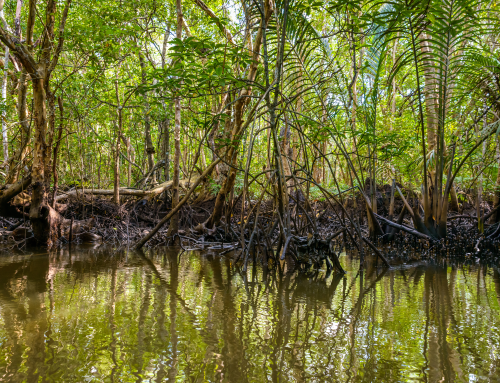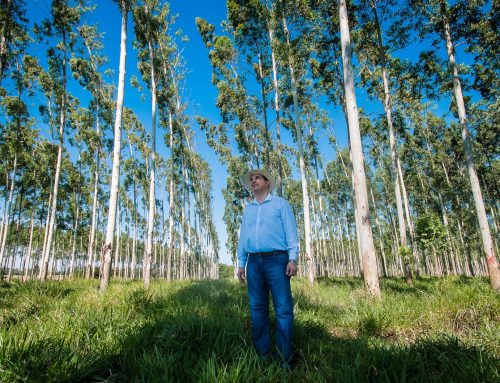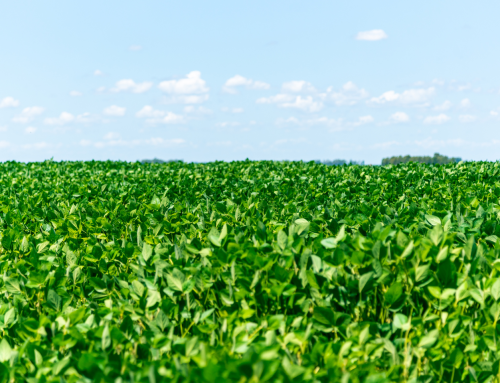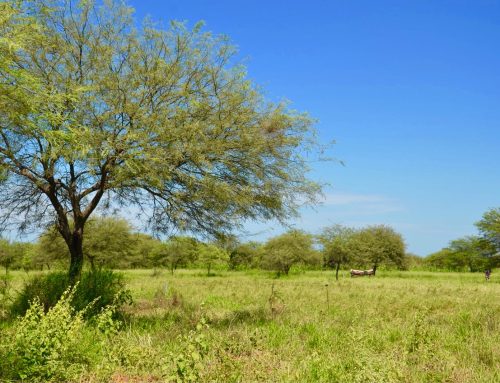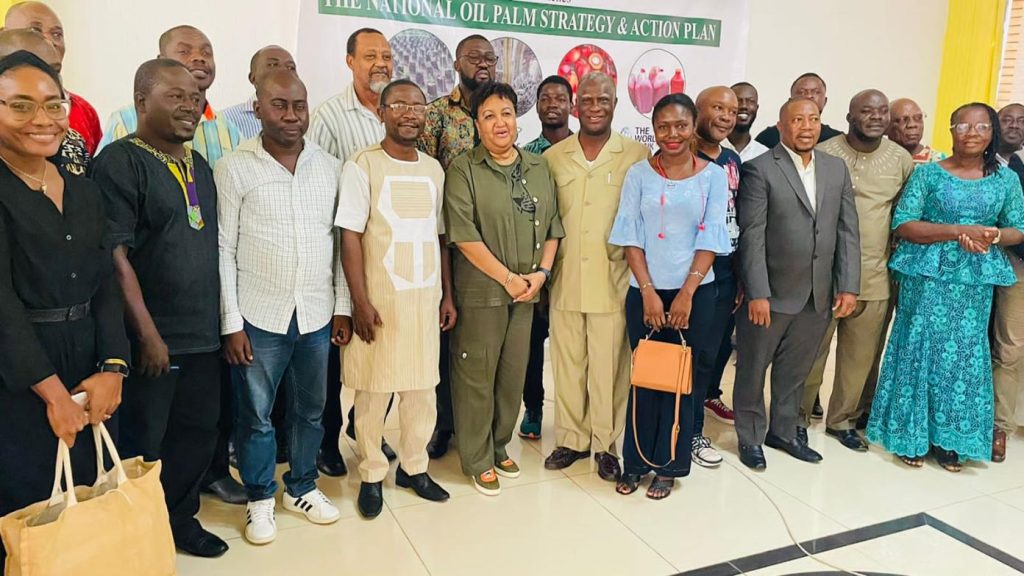
Jeanine Milly Cooper, Minister of Agriculture of Liberia at the NOPSAP Launch © UNDP, Liberia
What comes to mind when you think of Liberia? A strong vision of freedom, equity, and justice for all, the principles on which the country was founded? A difficult history of tensions between different, competing groups? Diverse, beautiful nature? How about a strong vision for sustainably produced palm oil which honours the richly biodiverse tropical forest, as a keystone of national economic strategy?
That strong, positive vision is what Liberia has been working towards, with the Good Growth Partnership1 (GGP)’s support, through multistakeholder dialogue and collaboration. And in April 2022 Liberia launched its National Oil Palm Strategy and Action Plan (NOPSAP), aiming to put sustainable palm oil production at the heart of Liberia’s national and inclusive rural economic strategy.
The results of this ambitious, collaborative process show that during the multistakeholder process, trust and compassion for the perspectives and needs of others significantly increased. Even sensitive issues, often denied and avoided where there are low levels of trust and engagement, were proactively explored for greater understanding, solutions proposed and discussed, and actions identified to address the most significant issues.
What’s the story so far, and what does all this mean for Liberia?
The story so far:
Liberia is forest and resource rich, but suffers from extreme poverty. The climate lends itself well to agriculture, however, and palm oil is one of Liberia’s key emerging export products. But there are some challenges.
Palm oil often gets bad press for social, labour, and environmental reasons, but the product itself isn’t the problem. The issue – as with any commodity – is how palm oil is produced, and how it co-exists within a complex network of environmental, economic, social, and political demands.
Liberia’s natural ecosystems are threatened, not only by climate change, but by logging, mining, and unsustainable agricultural practices – which themselves exacerbate climate change and local ecosystem instability. Without careful management and planning for sustainability, the expansion of any agricultural commodity can be rife with unintended environmental, economic, and social risks. At the same time, the dynamics of community land rights and agricultural expansion can have complex and hard-to-predict outcomes. Sustainable production of this particular commodity, palm oil, is vital in a nation where 21% of all households are employed in the sector. But sustainable production of commodities is notoriously difficult, and commodity supply chains are famously complex (three blogs exploring this topic will soon be live on this website).
Transforming systems requires the root causes – rather than the symptoms – of problems to be addressed, and this means adjusting relationships, structures, customs, mindsets, power dynamics, and rules. Effective Collaborative Action attempts to do just that, going deep into the root causes of unsustainable practices in food systems, and working with people at all levels, to identify the incentives, structures, and attitudes that make commodity supply chains ecologically unstable. This process is about understanding why people do the things they do, and finding out what stops them from behaving in other, more ecologically robust ways. It’s about building relationships and establishing trust, and helping people to recognise and understand the skills and experiences that each group and community can bring to the whole. Participants work together to design a future that works for them – and for the environment. The methodology was developed by the UNDP, based on 10 years of insight and learning about multi-stakeholder collaboration for sustainable commodities. Taking past lessons and visions of a more sustainable future to heart, the Government of Liberia and a wide range of stakeholders in the oil palm value chain have engaged in Effective Collaborative Action.
With so much at stake in the face of climate change, ecosystem degradation, biodiversity loss, and persistent poverty – even further influenced by crises such as global pandemics and international conflicts – Effective Collaborative Action is a toolkit for our times. The National Oil Palm Platform of Liberia (NOPPOL) fully engaged in that process, bringing together oil palm farmers, concession managers, processors and marketers, government institutions, international organisations, and civil society to develop solutions to the challenges facing Liberia’s oil palm supply chain. Together, they defined a common set of objectives built around oil palm as an environmentally, socially, and economically sustainable crop, with No Deforestation at its core. In April 2022, the result of Liberia’s engagement in Effective Collaborative Action was the National Oil Palm Strategy and Action Plan (NOPSAP).
[1] GGP targets impacts in a number of key areas, using its Integrated Approach to sustainable production, responsible demand and sustainable finance to break down silos and bring about systemic change. GGP is a partnership of Conservation International, the Global Environment Facility, the International Finance Corporation, the United Nations Environment Programme, and World Wildlife Fund.
“All key stakeholders: government, private sector, NGOs, business associations, and smallholder associations have the same strong determination to create a more sustainable Liberian palm oil industry from a social, economic, and environmental point of view.”
Jeanine Milly Cooper, Minister of Agriculture of Liberia on the National Sustainable Oil Palm Strategy and Action Plan
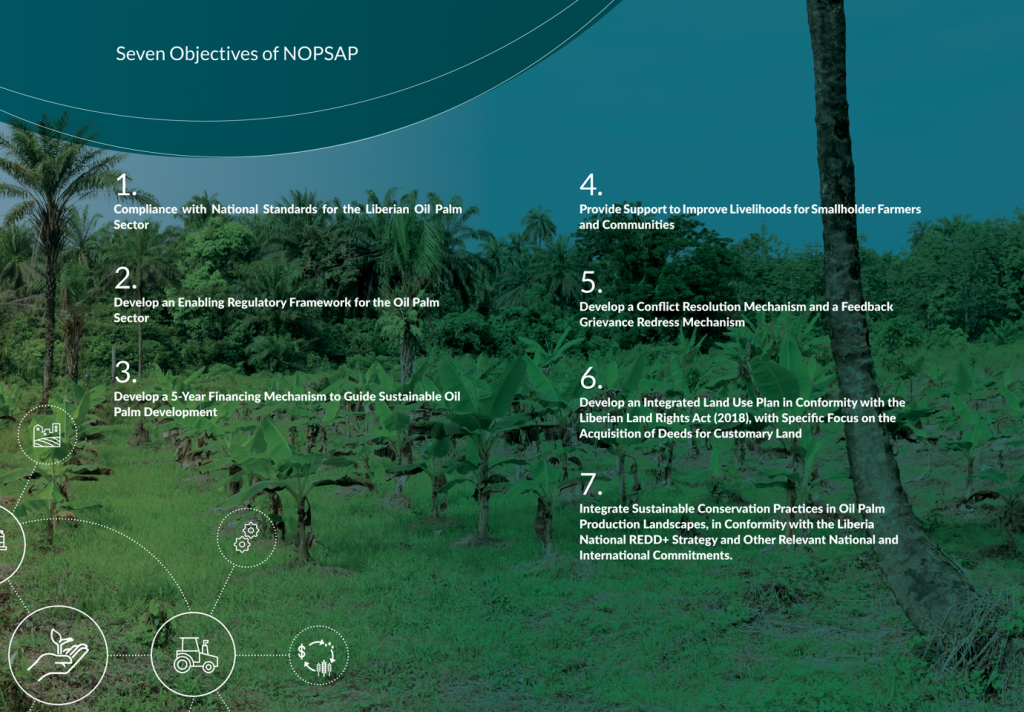
© National Sustainable Oil Palm Strategy and Action Plan, Good Growth Partnership
The role of NOPPOL had already been central to achieving Liberia’s National Interpretation (NI) of the Roundtable on Sustainable Palm Oil (RSPO) in 2021, which established a framework of Principles and Criteria, and the development of performance indicators, compliance guidance, and assessment tools to guide the production of sustainable palm oil. This framework, intended to guide investment, participation, and growth, has placed Liberia on a trajectory to sustainable palm oil which can be marketed and sold in the international market. NOPSAP will play an essential role in engaging communities over land-use, access, and allocation – and includes a National Conflict Resolution Strategy and a Feedback Grievance Redress Mechanism, learning from past lessons. The RSPO NI and NOPSAP implementation will help the palm oil sector in Liberia comply with forthcoming deforestation-free trade regulations from consumer countries, such as the European Commission’s Corporate Sustainability Due Diligence. It will also guide investments in Liberian palm oil, helping to build private sector engagement, as well as supporting opportunities for carbon- and climate finance.
Where next for the GGP in Liberia’s sustainable palm oil journey? An essential element to the collaborative action process, the outcomes that emerge from it, and the possibility of consolidation and further development, is trust. Often, even the most subtle change in attitudes, behaviours, perceptions, and relationships can be the most powerful ones to trigger systemic shifts. Understanding what perceptions block collaboration and change can provide powerful indicators for further engagement, learning, or intervention. The GGP’s system mapping process, already rolled out in Paraguay and Brazil, offers valuable lessons for other countries including Liberia. The Ladder of Change – a GGP tool developed to monitor and understand progress in collaborative action – has already been piloted in Liberia, revealing important insights about the country’s palm oil supply chain to help guide future interventions and developments.
While many positive changes were revealed, stakeholders felt that the representation and participation of women in discussions was limited, and that there was minimal dialogue about gender issues. Indeed, the topic of gender received by far the lowest amount of feedback in the Ladder of Change process, which itself suggests that more work needs to be done to overcome deep structural and cultural patterns. Attitudes to gender, authority, and hierarchy in every society have deep and complex root networks that feed and reinforce a foundation of ‘common sense’, contributing to intricate world views. Ecosystems of attitudes and behaviours are as sophisticated and interdependent as those of forests, and change of the scale required spans generations of understanding and expectation. This is no less than the change required of humanity globally, to address climate change: unavoidably and necessarily, it takes time.
While attitudes, habits, and world views take time to change, some structural frameworks like policies, finance, and legislation can be activated more quickly – and the work done so far in Liberia provides a good base. Facilitating a rapid move away from ‘business as usual’ towards more sustainable structures, systems, and behaviours, will require funding, however. In the next phase of this important work, GGP hopes to continue strengthening NOPPOL, to support stakeholders as they implement all the objectives of NOPSAP (including identifying and working to overcome resistance, unexpected changes, and the inevitable misunderstandings that arise in the transformation of complex systems), and to ensure that a system to monitor implementation is established. Facilitation and support from GGP will be essential to ensure all stakeholders move from strategic plans and into action. Both public – including from development partners – and private sector finance will be needed to do this, including leveraging opportunities in climate finance under the Paris Agreement. The steps so far are positive indicators of the potential for transformation in the Liberian palm oil sector (and, as a result, for society more broadly), and other agricultural commodities in Liberia – such as cocoa – will surely benefit from the lessons and framework of NOPPOL and NOPSAP.
“In the coming years, we envision in transforming Liberia’s oil palm development into a sustainable, vibrant, responsible, and productive economic sector that contributes to economic growth and wellbeing while maintaining forest cover and biodiversity. The commitment and vision that NOPPOL stakeholders share [to be actioned in the NOPSAP] are proof that Liberia is ready to make the change our industry needs. We acknowledge that achieving our vision will require continuous improvement for sustainable oil palm development. This will need strong dedication and commitment from all stakeholders to undertake the basic changes in business practices.”
Jeanine Milly Cooper, Minister of Agriculture of Liberia on the National Sustainable Oil Palm Strategy and Action Plan

